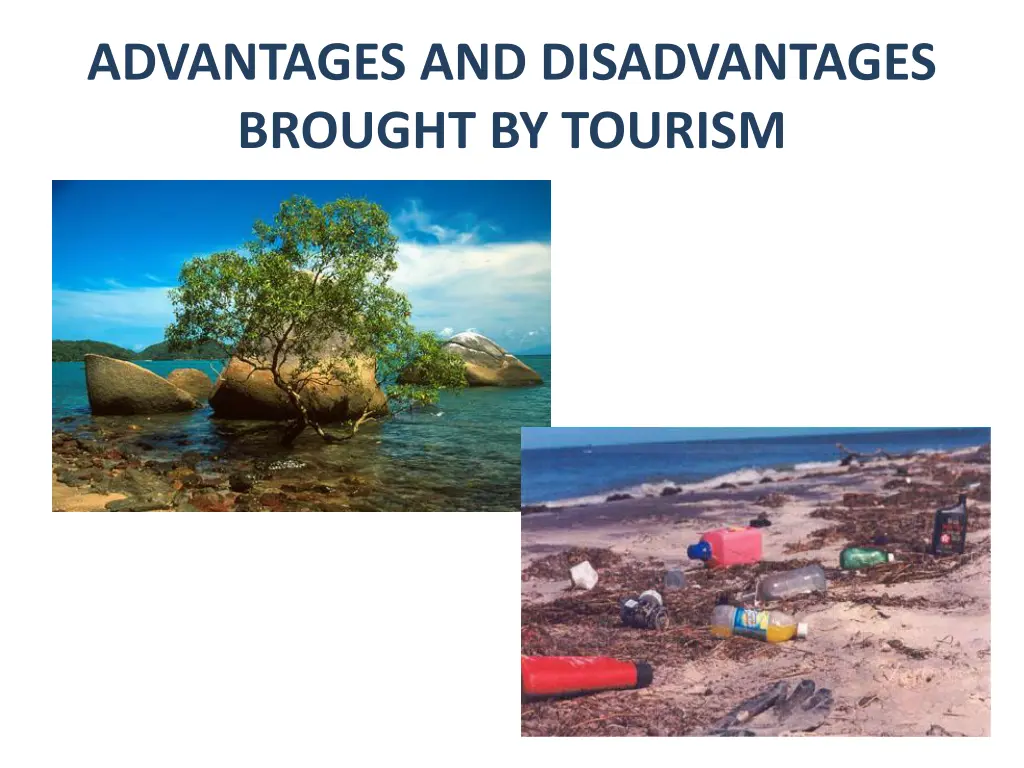
Exploring the Impact of Tourism on Sustainability
Discover the advantages and disadvantages of tourism, including the importance of sustainable practices such as green tourism and responsible tourism. Explore how sustainable tourism focuses on nature, local communities, and the economy, ensuring a harmonious balance between tourism development and environmental preservation.
Download Presentation

Please find below an Image/Link to download the presentation.
The content on the website is provided AS IS for your information and personal use only. It may not be sold, licensed, or shared on other websites without obtaining consent from the author. If you encounter any issues during the download, it is possible that the publisher has removed the file from their server.
You are allowed to download the files provided on this website for personal or commercial use, subject to the condition that they are used lawfully. All files are the property of their respective owners.
The content on the website is provided AS IS for your information and personal use only. It may not be sold, licensed, or shared on other websites without obtaining consent from the author.
E N D
Presentation Transcript
ADVANTAGES AND DISADVANTAGES BROUGHT BY TOURISM
Witness- see for yourself Look-out point- a place that offers panoramic view Upkeep- maintenance and preservation Cliff- a high, steep rock Arts and crafts- umetnost I zanati Habitat- a place where a plant species or an animal species lives Broaden- make wider Greed- a strong desire to have more money than you really need
SUSTAINABLE TOURISM Green Tourism Responsible Tourism
SUSTAINABLE TOURISM Sustainable tourism is tourism which cares about nature, local people and local economy.
NATURE Sustainability means caring about the environment. It means that renewable sources of energy are used (solar power, wind power etc), and that the use of electricity is reduced in general. Waste and rubbish are minimized and recycling is used wherever it is possible.
Environment- natural surroundings Renewable sources of energy- sources of energy that cannot we cannot run out of. We can run out of coal or oil, but not of the sun, wind and sea/rivers. Energy created by the power of the sun, wind or water is called green energy. Waste- unwanted material, usually created by industry, such as polluted water Rubbish- trash, garbage, small unwanted pieces of material left on some place
PEOPLE AND CULTURE Sustainable tourism means that the traditional way of life of local people is not changed completely because of tourism. Sustainability means that local community participates in decisions about building new accommodation capacities or tourism projects in general. Hotels cannot be built on holy places, at cemeteries or other places of cultural interest.
Local community- a group of people living together on one spot (village, small town etc)
LOCAL ECONOMY Sustainable tourism aims to involve local people in the business by employing them or by buying the food and other products they produce. It strives to provide economic benefit for local communities.
Sustainable tourism is an industry which attempts (tries) to make a low impact(influence) on the environment and local culture, while helping to generate income (create profit), employment, and the conservation of local ecosystems. It is responsible tourism that is both ecologically and culturally sensitive.
The Bedouin of Petra Revenue- profits To overshadow- to be stronger than Herd- a group of animals, usually cattle Flock- a group of animals, usually sheep Pastoralism- looking after sheep, cows etc. Hardship- difficult times Abuse- bad use
When the tourists flew in Boost- improve Indigenes- local, native people Texture- character Dawn- sunrise Sideshow- a small show offered in addition to the main one Scarce- rare, not enough Wage- money paid weekly to a worker
Defile- make dirty Squalor- filthiness, dirt Pageant- a pompous show Eyesore- something unpleasant to the eye Sidewalk ambassadors- native people who represent their country in the best light
